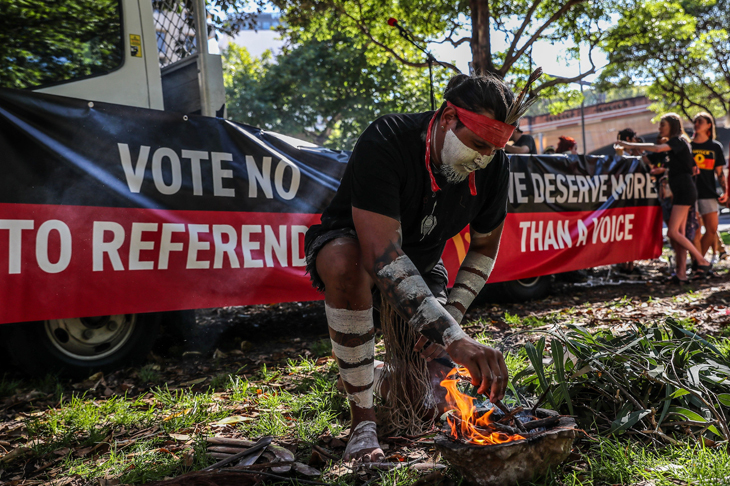There is so much ill-informed commentary on the proposed Aboriginal Voice and whether it will generate divisive litigation, that it is time to set out some home truths to help you decide how to vote. You may disagree, but at least consider them.
As with most issues, we can start with a short point. The short point is that we already know from the architects of the Voice that there will be litigation over the Voice’s advice and that, indeed, there ‘must’ be litigation. We know this because Marcia Langton, the arch-priestess and architect of the Voice, has told us so. Look, she claims, the idea that the Voice should not be subject to legal scrutiny in the courts fills her with ‘dismay’ and those who say it should be exempt from the courts are promoting ‘racism’. So, if the Voice is approved, don’t be surprised when an avalanche of endless litigation is launched for the Voice to get its own way through the courts and unelected judges and, naturally, without the Australian people or their parliament even being consulted.
What could this litigation be about? There are at least three scenarios that will generate divisive litigation. The first is where the Voice gives advice on something that it wants to have done, like a ban on citizenship ceremonies on Australia Day. But the elected government decides it will not agree to the Voice’s demands. It is almost impossible to believe that the Voice will just give up and accept the government’s decision without a fight. So, it takes the government to the High Court to get an order that the government should implement the demands the Voice has made. After all, it will argue, the indigenous people have spoken, so how can its advice just be ignored? As well as the Voice itself suing and even if it does not sue, Aboriginal individuals and the dozens of Aboriginal organisations that now exist could sue and probably will, even when they have only half a chance of succeeding, and they certainly have at least that chance.
The second scenario is the reverse of that situation, where the government decides to do something completely within the power of an elected government. This happens every day of the week. The Voice is consulted and advises the government that it is flatly opposed to the government performing this act. Nevertheless, the government decides to go ahead. Here again, it is almost impossible to believe that the Voice will just give up and accept the government’s decision without a fight. So, the Voice, and any Aboriginal person or organisation, will again litigate, at the expense of the taxpayer as usual, to get an order to stop the elected government doing what it was elected to do: make decisions.
The third scenario is even more likely. This one is where the government is chewing over a proposal that it might or might not adopt. It decides that it will go ahead but does not have the time or the inclination to get advice from the Voice. Or it might simply say, yes the Voice is a good thing and we love it, but the issue it is thinking about is not a matter specifically ‘relating to Aboriginals’, but a matter relating to everyone, like defence, immigration, health, refugees or a new mining or gas project; therefore, it is not within the ambit of the Voice and consultation is not necessary. The Voice disputes this and decides to litigate and claim that there was no consultation when there should have been, or that the consultation was not good enough and there should be more consultation. Hey ho, off to court we go. Again!
Under all three of these scenarios, the claimants will say the Voice was approved at the referendum, so it should have its way. Otherwise, what was the point of creating it? Win, lose or draw, the Commonwealth is thus embroiled in years of litigation.
Now that we can see how litigation will be generated by the Voice, the next question is whether, if any of these scenarios is pursued, can the High Court actually do anything to stop the government from carrying out its decisions or order it to act in a different way? Yes, it can. The constitution already provides that the High Court has power to issue what are called writs of mandamus and prohibition against the Commonwealth so there is no doubt it has the power. Mandamus is an order that the executive government must stop doing something. Prohibition is an order that the government must do something else. So, the power is already there, ready to be used in litigation that Ms Langton says we ‘must’ have.
The same issue will arise even if the Voice is limited to advice it gives to the parliament, not just to the executive government. The High Court is not going to order the parliament to pass a law or to stop doing something. But if the parliament does not ask for or accept advice from the Voice and it passes a law on a matter relating to Aboriginals, the High Court can rule that it was unconstitutional to do so when advice should have been sought from the Voice but was not, or that the consultation was not thorough enough.
If I am wrong on all this, why not release the legal advice from the Solicitor-General so that we can see exactly what he thinks?
The litigation generated will be endless. And if there is anything that lawyers like, it is endless litigation, especially if the taxpayer is paying.
Once the Voice is enshrined in the constitution, it will stay there, unless and until there is another referendum that takes it out. And the chances of any government being foolish enough to reopen that contentious issue are non-existent. So, if the Voice is passed, get ready for a lifetime of litigation. And thank you in advance for paying for it.
Got something to add? Join the discussion and comment below.
Get 10 issues for just $10
Subscribe to The Spectator Australia today for the next 10 magazine issues, plus full online access, for just $10.
You might disagree with half of it, but you’ll enjoy reading all of it. Try your first month for free, then just $2 a week for the remainder of your first year.















Comments
Don't miss out
Join the conversation with other Spectator Australia readers. Subscribe to leave a comment.
SUBSCRIBEAlready a subscriber? Log in